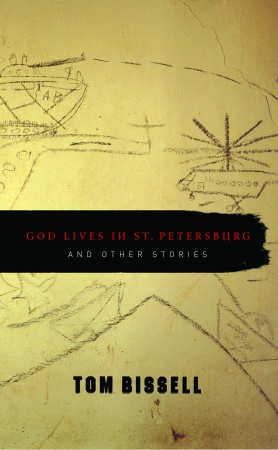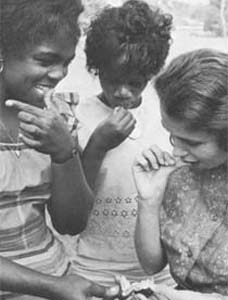
When expatriates crack up abroad, who or what is to blame? It's as much the person as the place in Tom Bissell's collection of stories about Americans traveling through Central Asia
Out of Control
When expatriates crack up abroad, who or what is to blame? It's as much the person as the place in Tom Bissell's collection of stories about Americans traveling through Central Asia.
By Katherine Shonk
Published: February 4, 2005
Two young American men meet by chance in a cafe in a Central Asian capital. Alec, the exuberantly dissolute son of the local U.S. ambassador, was recently caught by his mother in flagrante delicto with two Russian girls in the embassy's basement. Ryan, a missionary in the midst of a nervous breakdown, is leaving the country the next day, having disgraced his host agency with his own indiscretions.
"In the past nine months," Ryan tells Alec a few minutes into their acquaintance, "I've repeatedly had to go to the bathroom in a hole. Horse has been a dietary staple. I've been stoned, mugged twice, and harassed by the SNB. I'd never tasted alcohol in my life before I came here, but I managed to spend an entire week drunk. I've been in three fistfights, two of them with children. I cheated on my wife twenty-seven times, nearly lost my faith in God, and in the meantime successfully managed to evangelize only ten people."
"That's not too bad," Alec responds. "Only two less than Jesus."
This passage comes early in "The Ambassador's Son," one of six short stories in Tom Bissell's debut fiction collection, "God Lives in St. Petersburg." Both Alec and Ryan appear to have hit rock bottom -- yet it turns out they have much farther to fall.
When expatriates crack up abroad, who or what is to blame? It's easy to pin an overseas crisis -- whether of faith, conscience or confidence -- on the host nation itself. Exotic locales are breeding grounds for alienation, fear and loneliness; depravity and depression often follow. But expatriates arrive with their own baggage. Reckless as gamblers, idealistic as missionaries (and often one or both by trade), they seek more fulfilling lives in places they don't know very well. No surprise that when they crash, they crash hard.
"God Lives in St. Petersburg," which, despite its title, is set primarily in post-Soviet Central Asia, is populated by expatriates crashing spectacularly. Whether saving souls in Samarkand, documenting war in Afghanistan, or pleasure-tripping in Almaty, American characters stake their claims to salvation, adventure and the spoils that wealthy visitors to poor nations expect as their due. In the process, they retrace the psychological and cultural missteps of the most deluded crusaders and colonialists.
A Peace Corps volunteer in Uzbekistan during the mid-1990s, Bissell returned in 2001 to research the depletion of the Aral Sea. His first book, "Chasing the Sea," was an enthralling, hour-by-hour account of the trip. Bissell's writing conveys a passion for this part of the world and an intense curiosity about the motives of Central Asians and visiting Westerners alike.
The American travelers in "God Lives in St. Petersburg" are multi-faceted, which is to say they are often unlikable. Bandits, soldiers and kidnappers punish them for their carelessness and naivete, and the threat of violence is a constant. "Aral" explains how Amanda Reese, an environmental biologist visiting the Aral Sea as part of a small UN delegation, winds up the captive of a man who may or may not be a government spy. In a risky and satisfying twist, the story's focus switches from petulant Amanda and her arrogant colleagues to characters more worthy of the reader's sympathy.
"Expensive Trips Nowhere" finds New Yorkers Douglas and Jayne in the wilds of Kazakhstan, enduring another of the senseless vacations he has been springing on her since inheriting money from his parents. "Steppe makes strong what is strong ... Makes weak what is weak," cautions war veteran Viktor, their contemptuous Russian guide. Throughout the trek, Douglas, a man who once accidentally broke his wife's arm in a game of touch football, is handed new and bigger opportunities to disappoint her.
Bissell's stories are long and bursting at the seams with clever dialogue, well-sculpted settings and full characters. It is a rare pleasure to find a young writer (Bissell was born in 1974) handcrafting prose with such patient care. Constructed in the tried-and-true shape of a roller coaster, the stories chug to dramatic and emotional peaks, then plunge earthward, leaving the reader shaken and dazzled.
The centerpiece of the collection is "Death Defier," which introduces us to Donk St. Pierre, a combat photographer from Michigan who is roaming Afghanistan during the recent war. Donk has been obsessed with death since witnessing his father's final days; his therapist labels his compulsive war-hopping "chronic habitual suicide." After a car crash on the highway to Kunduz, Donk and his traveling companion, Graves, a British journalist succumbing to malaria, are stranded at a warlord's compound. ("A good warlord!" their translator assures them.) With no hope of procuring life-saving medicine for his friend, Donk reluctantly sets off for a distant valley to gather grasses prescribed by the warlord's "doctor." In an ending as sinister as that of a Flannery O'Connor story, Donk is forced to confront the specter of death without his camera's protective lens.
The title story offers the starkest condemnation of Americans trying to outrun their fears abroad. As "God Lives in St. Petersburg" opens, Timothy Silverstone, a young missionary, is losing his faith: "When he came to Central Asia, he felt peace with God as a great glowing cylinder inside of him, but the cylinder had grown dim." To his utter horror and disgust, Timothy has fallen into the daily habit of sleeping with a young man named Sasha. In the midst of his psychic break, the Russian mother of one of Timothy's students offers up her 14-year-old daughter. "She will do for you whatever you ask," the woman says, if only Timothy will take the girl to America as his wife. The ending is unflinching and beyond bleak.
"Animals in Our Lives" is the only story set in the United States, and, perhaps inevitably, it is also the tamest. Franklin has recently aborted a stint teaching English in Kyrgyzstan to try to resuscitate his relationship with his unfaithful fiancee back home. The action unfolds in the confines of a Michigan zoo, a milieu that allows for plenty of metaphorical comparisons between Franklin and the trapped fauna. Bissell deftly portrays a couple lurching away from each other in fits and starts: "Kindness, once as uncomplicated as respiration, has a sick new venturesome quality. Anything they do for each other now is fuel for yet another misunderstanding." The story would stand up well in a collection set in the United States but, lacking the rest of the book's scenic and cultural pyrotechnics, seems misplaced as the final tale.
"In the end I could not really goad myself into believing that one's surroundings possessed some override able to strip away our human layers of civility and mercy," Bissell wrote in "Chasing the Sea," reacting to stories of government-sponsored torture in Uzbekistan. "At this moment, however, it made me feel better to think that it could."
Any privileged visitor to a struggling region can be excused for wanting to believe that brutality comes from outside rather than from within. To think otherwise would be to accept that we are capable of propelling ourselves and others toward disaster. In "God Lives in St. Petersburg," Americans do just that, setting up elaborate obstacle courses on punishing terrain. Their failure to pass these tests says as much about their unrealistic expectations and self-delusions as it does about the dangers and temptations that surround them.
Katherine Shonk is the author of "The Red Passport," a collection of short stories set in contemporary Russia.








